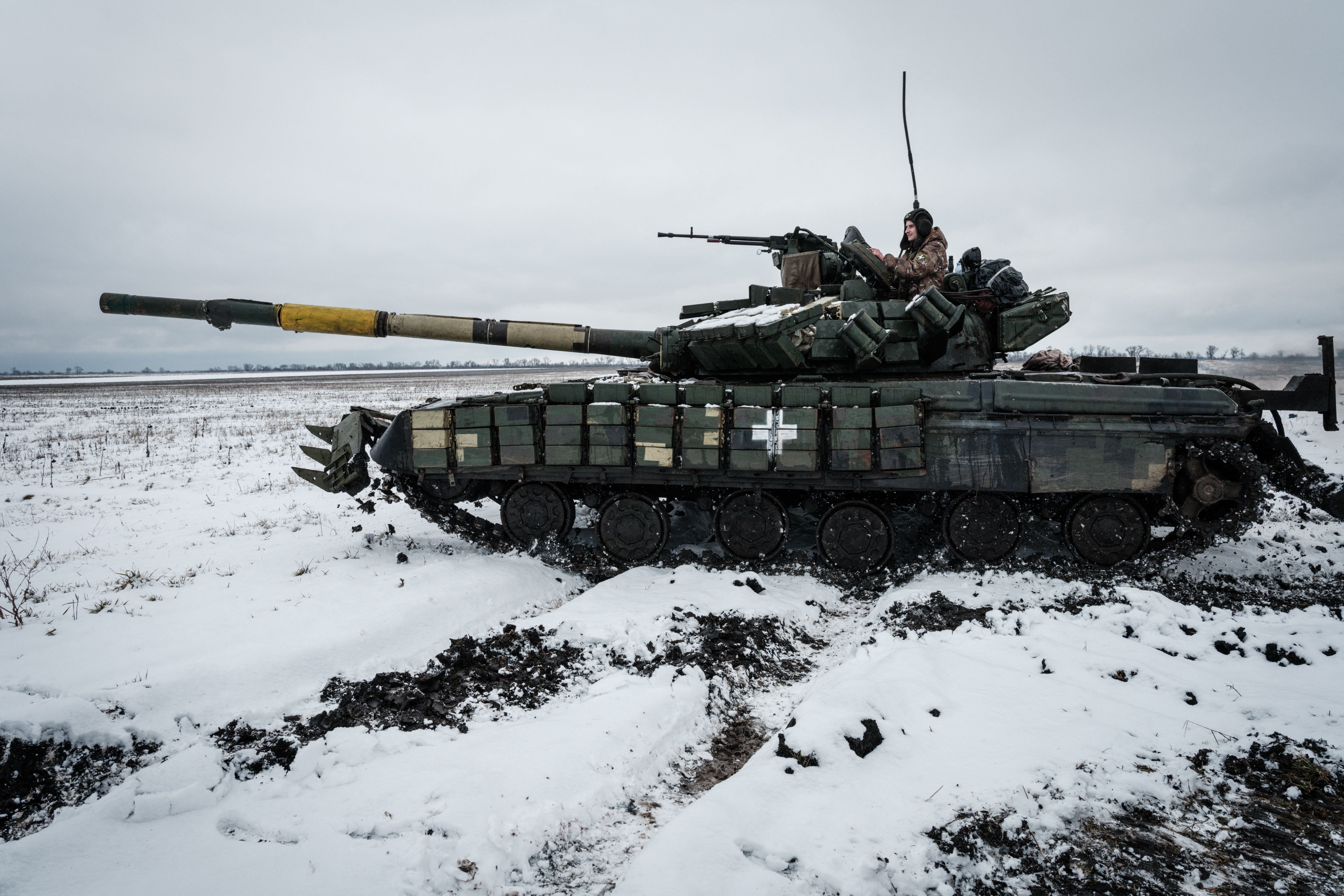Russia launches rocket assault on Ukraine as it steps up eastern offensive
Ukraine has long feared a new offensive by Russian troops ahead of the anniversary of Moscow’s invasion on 24 February

Your support helps us to tell the story
From reproductive rights to climate change to Big Tech, The Independent is on the ground when the story is developing. Whether it's investigating the financials of Elon Musk's pro-Trump PAC or producing our latest documentary, 'The A Word', which shines a light on the American women fighting for reproductive rights, we know how important it is to parse out the facts from the messaging.
At such a critical moment in US history, we need reporters on the ground. Your donation allows us to keep sending journalists to speak to both sides of the story.
The Independent is trusted by Americans across the entire political spectrum. And unlike many other quality news outlets, we choose not to lock Americans out of our reporting and analysis with paywalls. We believe quality journalism should be available to everyone, paid for by those who can afford it.
Your support makes all the difference.Russia has launched a large-scale missile assault on Ukraine – hitting a number of cities – as a military push from Moscow picked up pace in the east of the country.
Ukraine’s air force said 61 of 71 Russian missiles had been shot down. But the energy minister, German Galushchenko, said Russia had hit power facilities in six regions with missiles and drones, causing blackouts across most of Ukraine. At least 17 missiles hit the southeastern city of Zaporizhzhia in an hour, acting mayor Anatolii Kurtiev said, in the most intense attack the city has faced since the start of Russia’s invasion.
Kyiv’s mayor Vitali Klitschko said 10 Russian missiles had been shot down over the Ukrainian capital, after sirens blared during the morning rush hour and weary civilians took shelter.
European Council president Charles Michel said the “indiscriminate” attacks constitute “war crimes” against Ukraine. “The EU and its member states stand by Ukraine and all Ukrainians. And will further speed up the provision of military equipment, including air defence,” he tweeted. The Kremlin has denied that it targets civilians.
Moldova’s defence ministry said that a missile was detected crossing into its airspace near the border with Ukraine. The country’s foreign ministry said in a statement that the Russian ambassador in Chisinau, the Moldovan capital, had been summoned for talks over the “unacceptable violation”.
The spokesperson for Ukraine’s air forces, Yurii Ihnat, said that another missile had crossed into airspace belonging to Romania, a Nato member country. Romania’s defence ministry denied the report, however, saying that the closest the missile came to Romania’s airspace was approximately 20 miles.
The Kremlin is striving to secure regions it annexed illegally last September – Donetsk, Kherson, Luhansk and Zaporizhzhia – and is currently concentrating its efforts on gaining full control of the Donbas [Donetsk and Luhansk], Kyiv claims.
In the Donetsk region, local Ukrainian officials reported that the Russian military had deployed additional troops and launched offensive operations. “There is a daily escalation, and Russian attacks are becoming active throughout the region,” the governor, Pavlo Kyrylenko, said. In Luhansk province, the Russian army is trying to punch through Ukrainian defences, according to the governor, Serhii Haidai.
“The situation is deteriorating, the enemy is constantly attacking, the Russians are bringing in a large amount of heavy equipment and aircraft,” Mr Haidai said.
Denis Pushilin, the Moscow-appointed administrator of the Donetsk region, claimed that Russian forces had secured positions on the southern outskirts of the town of Vuhledar in Donetsk. Vuhledar is a strategically important town that sits next to a railway link crossing the region on the way to Crimea. Capturing the town is important for Russia in order for it to secure the safety of the railway connection to Crimea and advance its goal of seizing the entire Donetsk region. Mr Pushilin said that Ukraine had sent additional reinforcements to the town, which had slowed the Russian advance.
Britain’s Ministry of Defence (MoD) said in a briefing on Friday that Russian forces, while making some advances near Vuhledar, were thought to have lost dozens of amoured vehicles in a single, failed assault on the town. “Russian troops likely fled and abandoned at least 30 mostly intact armoured vehicles in a single incident after a failed assault,” the MoD said. Moscow’s forces have been making clear, if gradual, advances in the area in the past month, notably capturing the salt-mining town of Soledar to the north of Bakhmut.
Ukraine has long feared a new offensive by Russian troops ahead of the anniversary of the invasion on 24 February. In Moscow, it was announced on Friday that Vladimir Putin would give his delayed annual showcase address to parliament on 21 February. That was the date last year when he recognised as independent the parts of the Ukrainian regions of Donetsk and Luhansk that were then controlled by Russian-backed separatists, in a prelude to the invasion.
US president Joe Biden will travel to Poland from 20 to 22 February to mark the first anniversary of the invasion, the White House has announced.
Also on Friday, Moldova’s pro-EU government resigned after a turbulent 18 months in power marked by economic turmoil and the spillover effects of Russia’s invasion. President Maia Sandu accepted prime minister Natalia Gavrilita’s resignation, and nominated 48-year-old presidential aide and former interior minister Dorin Recean to replace her.
Meanwhile, in the world of sport, pressure grew for an outright ban on Russian athletes at the 2024 Olympics, with Lithuania saying that 35 countries, including major sports powers the United States, Germany and Australia, would demand that such a ban be put in place.
Reuters and Associated Press contributed to this report
Join our commenting forum
Join thought-provoking conversations, follow other Independent readers and see their replies
Comments